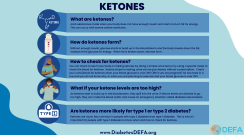Diabetes complications can affect various organs and systems in the body, including the heart, kidneys, eyes, nerves, and blood vessels. Common complications include cardiovascular disease, kidney disease, diabetic retinopathy, neuropathy, foot ulcers, and increased risk of infections. Proper management of diabetes through medication, lifestyle changes, and regular medical check-ups is crucial in preventing or delaying these complications.
- Posted: 31 May 2023
Diabetic ketoacidosis (DKA) is a serious and potentially life-threatening complication of diabetes, most commonly associated with type 1 diabetes. It occurs when there is a severe shortage of insulin in the body, leading to a buildup of ketones (acidic byproducts of fat breakdown) in the blood.
Topics: Diabetes Management
- Posted: 31 May 2023
Ketones are chemical compounds produced by the liver when there is a shortage of insulin or when the body cannot effectively use glucose as an energy source. They are byproducts of the breakdown of fatty acids in the liver.
Topics: Diabetes Management
- Posted: 06 December 2023
Lowering Diabetes Complication Risk
Taking proactive steps like managing blood glucose levels, maintaining a healthy lifestyle, and regular check-ups can significantly reduce the risk of diabetes-related complications, such as heart disease, kidney problems, nerve damage and vision loss. Prioritize your health to prevent these issues.




